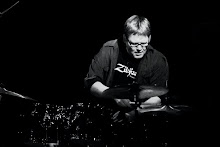Hi and welcome to part 3 of the series where Four on The Floor, Cruise Ship drummer and I all write about a given subject. This time we're talking about technique, specifically on how it relates to the drums.
What is technique? Well, one definition of technique I found states that it's a way of carrying out a particular task, especially the execution or performance of an artistic work or a scientific procedure.
I bring up this definition because often technique is equated with "velocity". I suppose speed is one tiny aspect of technique, but there's so much more to it than that. I'm now going to take us through all the things that, for me, define technique.
1. Time feel
I have never had a " you got it, or you don't" philosophy. To play good time at various tempos and styles, is challenging, and must be practiced! Sure, everyone has tempos and feels they gravitate towards, but to truly fill in the gaps, we have to work on this tempos that are challenging to us. Case in point, I am naturally a very ahead of the beat player, so to learn to lay back better, I had to practice playing behind the metronome, and play along with great back of the beat drumming, and to learn to place the feel where the drummer on the recording was. Like most aspects of music, time feel is something we work towards, and is a HUGELY important technique. I'm also including playing rubato in this! That's another technique that's frequently ignored.
2. Dynamics
This is ignored a ton by people. Playing the same things at different volume levels while maintaining time and groove is challenging, to say the least. Proud of your blisteringly fast single stroke roll? Let's hear it at ppp. If you can't do it, your technique is not what you thought it is.
3. Sound
Closely related to dynamics. Simply put, what do people hear when we play, and is it what we intended them to hear. Where are we striking the instruments? If I'm hitting rims constantly, it may be I have some sort of "concept", but it's more likely I have to refine my technique. This is part of the reason I don't put much stock in "pad practice", because it doesn't deal with sound at all, unless you're going to play a practice pad on the gig!
4. Creativity
Another thing that gets better the more we pay attention to it. If we constantly try and find different avenues, sounds, and textures it tends to perpetuate itself! Don't be satisfied with doing the same things?having the same set up/checking out the same music all the time. That's bad technique, as far as I'm concerned!
I think because velocity can be easily measured ( they don't give out those pseudo wrestling belts for being able to play a really slow, sensuous Bossa!) it's often focused on at the expense of all the above considerations.
5. General Concept of the drums
There are a lot of different ways to approach playing this instrument. Over the course of my career, I realized I wanted to be working with the drums. I view my instrument as someone I am singing or dancing with. To be honest, I hear a lot of ham-fisted and stiff drumming out there. I think when one's first goal is to be impressive and fast, the drummer becomes more like someone colonizing and controlling the drums rather than someone engaged in a dialogue. The latter is what inspires me. Just a few of the drummers doing this ( and I'm bringing this group up because I've heard these players most recently ) would be people like Joe LaBarbara, Allison Miller, and a delightful young drummer I was just hipped to, J.D. Beck.
As people who read this blog know, I rarely "out" anyone, even when I don't like what they're doing. I will, however make an exception for the renowned ( for her racism rather than her drumming) individual Hillary Jones, who exemplifies the "colonial" style drumming of which I speak. This shows up as much in her drumming as her words.
I guess what I'm getting at the end here is, how are each of us going to approach technique, and I think deciding what's most important whether it be fast single strokes, grooving like Levon Helm, or Instagram-ready stick twirling is something we all have to figure out.
Okay, now go work on your technique.

No comments:
Post a Comment